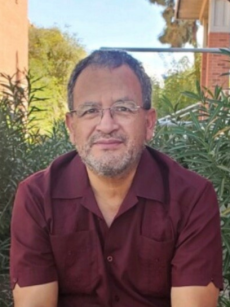
elo

Currently Teaching
SPAN 102 – Second Semester Spanish
Oral approach.
SPAN 160C1 – The Arts and Politics in Latin America
This course deals with the relationship between politics and cultural expressions in Latin America. These cultural expressions studied are literature, muralism, music, paintings, documentaries, escrache and cinema. How do these expressions relate to what was, and it's still happening in Latin American society? How do people in power shape systems? How do artists criticize or support governments? How do their art reflect their context?
Students will investigate and analyze how governments collaborate shaping the system, and explore how changes such as dictatorships, revolutions, conquests, etc., affect a society, and discuss how art helps us have a better understanding of our history and our role as global citizens.
This course deals with the relationship between politics and cultural expressions in Latin America. These cultural expressions studied are literature, muralism, music, paintings, documentaries, escrache and cinema. How do these expressions relate to what was, and it's still happening in Latin American society? How do people in power shape systems? How do artists criticize or support governments? How do their art reflect their context?
Students will investigate and analyze how governments collaborate shaping the system, and explore how changes such as dictatorships, revolutions, conquests, etc., affect a society, and discuss how art helps us have a better understanding of our history and our role as global citizens.
SPAN 160D1 – Issues in Latin American Society and Popular Culture
This course is an introduction to fundamental concepts, practices, and approaches to the study of popular culture and politics in Latin America. We will explore diverse themes such as African slavery, religion, political violence, political power, the role of women in history and politics, the youth in political conflicts, nationalism, U.S.-Latin America relations, peasant insurgency, and human rights. Students will also develop an awareness of the social and historical contexts in which these manifestations developed throughout the construct of what we now call "new nations" in Latin America. The course will concentrate on case studies from six different countries: Mexico, Cuba, Peru/Ecuador/Bolivia, Argentina, Chile and Brazil. An important component to the course will be the examination of how Latin America and its culture is portrayed in the United States.
This course is an introduction to fundamental concepts, practices, and approaches to the study of popular culture and politics in Latin America. We will explore diverse themes such as African slavery, religion, political violence, political power, the role of women in history and politics, the youth in political conflicts, nationalism, U.S.-Latin America relations, peasant insurgency, and human rights. Students will also develop an awareness of the social and historical contexts in which these manifestations developed throughout the construct of what we now call "new nations" in Latin America. The course will concentrate on case studies from six different countries: Mexico, Cuba, Peru/Ecuador/Bolivia, Argentina, Chile and Brazil. An important component to the course will be the examination of how Latin America and its culture is portrayed in the United States.
This course is an introduction to fundamental concepts, practices, and approaches to the study of popular culture and politics in Latin America. We will explore diverse themes such as African slavery, religion, political violence, political power, the role of women in history and politics, the youth in political conflicts, nationalism, U.S.-Latin America relations, peasant insurgency, and human rights. Students will also develop an awareness of the social and historical contexts in which these manifestations developed throughout the construct of what we now call "new nations" in Latin America. The course will concentrate on case studies from six different countries: Mexico, Cuba, Peru/Ecuador/Bolivia, Argentina, Chile and Brazil. An important component to the course will be the examination of how Latin America and its culture is portrayed in the United States.
SPAN 210 – Latin America on Film
Throughout its history, Latin America has witnessed a conflict of social, cultural and political differences. The challenges of defining Latin America have been arduous and at times difficult. Each academic discipline has taken a narrow prospective view of what is Latin America. Therefore, this class Introduces students to the concept and origins of popular culture and to social theories used to analyze its impact on self, culture in modern consumer societies and national and regional images of identity. Students will focus on understanding the history, politics, cultural, and social reality changes in Latin America.
Throughout its history, Latin America has witnessed a conflict of social, cultural and political differences. The challenges of defining Latin America have been arduous and at times difficult. Each academic discipline has taken a narrow prospective view of what is Latin America. Therefore, this class Introduces students to the concept and origins of popular culture and to social theories used to analyze its impact on self, culture in modern consumer societies and national and regional images of identity. Students will focus on understanding the history, politics, cultural, and social reality changes in Latin America.

